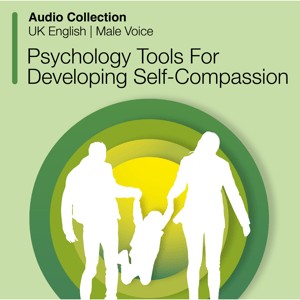Psychology Tools For Overcoming PTSD Audio Collection
This audio collection is designed to help people struggling with symptoms of post-traumatic stress disorder (PTSD). It provides guided techniques to increase physical soothing, help clients to ground themselves in the here-and-now, retrain the brain to respond differently to trauma triggers, and to improve sleep.

Download or send

Overview
Post-traumatic stress disorder (PTSD) is a condition that develops in response to traumatic experiences, resulting in symptoms including such as flashbacks, hypervigilance, and a current sense of threat. The Psychology Tools For Overcoming PTSD Audio Collection offers a structured series of exercises designed to help clients manage these symptoms effectively.
This collection provides practical strategies which focus on grounding techniques, relaxation strategies, and emotional processing to help individuals regain a sense of control and stability. The resource is suitable for guided independent use or integration into therapeutic practice.
Why Use This Resource?
This collection offers techniques grounded in the evidence-based to support individuals experiencing PTSD-related distress. It provides:
- Structured exercises to help regulate emotions and reduce PTSD symptoms.
- Guided interventions based on CBT principles to promote trauma recovery.
- Practical application, making it useful for both clients and clinicians.
- Self-paced learning, allowing users to build skills at their own comfort level.
Key Benefits
Regulation
Stabilization
Flexibility
Accessibility
Who is this for?
Post-Traumatic Stress Disorder (PTSD)
Supports individuals in managing flashbacks, hypervigilance, and avoidance behaviors.
Complex Post-Traumatic Stress Disorder (C-PTSD)
Can help to address difficulties related to childhood or repeated trauma.
Acute Stress Disorder
Provides early intervention strategies to prevent long-term distress.
Dissociation
Aids individuals in grounding themselves during dissociative episodes.
Survivors Of Abuse And Assault
Offers tools to regain safety, stability, and self-compassion.
Combat Veterans & First Responders
Addresses trauma responses related to duty-related stressors.
Accident, Disaster, or Medical Trauma Survivors
Supports individuals coping with trauma from accidents, disaster, medical procedures or serious illness.
Integrating it into your practice
Educate
Provide clients with an understanding of PTSD symptoms and trauma-informed approaches.
Introduce
Select relevant exercises based on individual client needs and readiness.
Practice
Encourage clients to use the guided exercises between therapy sessions.
Reflect
Discuss experiences and insights gained from practicing the techniques.
Adapt
Modify strategies to suit individual progress and comfort levels.
Sustain
Encourage ongoing use of these exercises to reinforce long-term improvement.
Theoretical Background & Therapist Guidance
The Psychology Tools For Overcoming PTSD Audio Collection is informed by trauma-focused cognitive behavioral therapy (TF-CBT) and contemporary models of trauma recovery. PTSD develops when traumatic experiences are encoded and retrieved in a way that continues to signal threat, even in the absence of current danger. Effective interventions aim to reduce this ongoing sense of threat, support emotional regulation, and help individuals feel safe again in their bodies and environments.
This collection draws upon established psychological theories and clinical practices to provide structured, practical support:
- Trauma memory processing: Traumatic memories are often stored in a fragmented and sensory-driven manner, contributing to re-experiencing symptoms such as flashbacks and intrusive thoughts. Techniques that promote discrimination between 'then' (the time of the trauma) and 'now' are designed to promote a sense of safety.
- Physiological arousal: Many people with PTSD experience chronic hyperarousal and a dysregulated nervous system. Techniques such as breathing retraining and progressive muscle relaxation help restore autonomic balance.
- Avoidance and re-engagement: PTSD often involves avoidance of reminders or triggers, which can maintain distress over time. Grounding and mindfulness exercises support clients to reorient to the present moment and gently face previously avoided experiences in a safe, controlled way.
This resource is suitable for integration into trauma-focused therapy or as a stabilizing adjunct in the early phases of treatment. It is also appropriate for guided self-help under professional supervision. The structured format allows clients to develop skills incrementally, with therapist support or independently.

What's inside
- An Introduction to PTSD and trauma recovery principles.
- Physical soothing techniques, including breathing exercises and muscle relaxation.
- Grounding techniques to reduce dissociation and hyperarousal.
- Cognitive strategies to retrain trauma-related thought patterns.
- Sleep strategies for managing PTSD-related insomnia.
FAQs
How This Resource Improves Clinical Outcomes
By incorporating this resource into treatment, clinicians and clients can expect:
- Techniques help regulate emotions and reduce PTSD symptoms.
- Exercises to support grounding and emotional resilience.
- Learning how to manage trauma-related reactions more effectively.
- Techniques support improvements in sleep quality and stress reduction.
Clinicians Who Use This Resource Also Use
References And Further Reading
- Brewin, C. R., Gregory, J. D., Lipton, M., & Burgess, N. (2010). Intrusive images in psychological disorders: Characteristics, neural mechanisms, and treatment implications. Psychological Review, 117(1), 210-232. https://doi.org/10.1037/a0018113
- Ehlers, A., & Clark, D. M. (2000). A cognitive model of posttraumatic stress disorder. Behaviour Research and Therapy, 38(4), 319-345. https://doi.org/10.1016/S0005-7967(99)00123-0
- Schauer, M., & Elbert, T. (2015). Dissociation following traumatic stress. Journal of Psychology, 218(2), 109-127.
Why Psychology Tools?
Get Support
Sign Up
- © 2025 Psychology Tools. All rights reserved
- Terms & Conditions
- Privacy Policy
- Cookies Policy
- Disclaimer
We value your privacy
This site uses strictly necessary cookies to function. We do not use cookies for analytics, marketing, or tracking purposes. By clicking “OK”, you agree to the use of these essential cookies. Read our Cookie Policy


